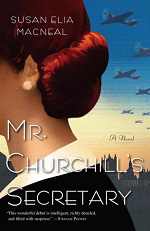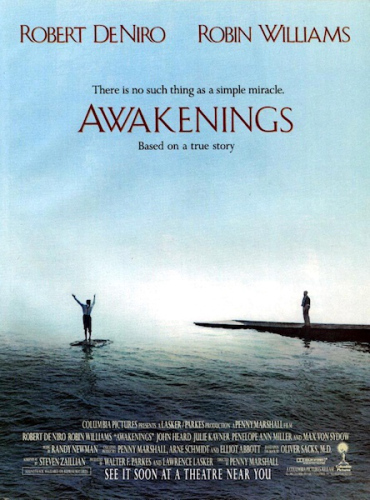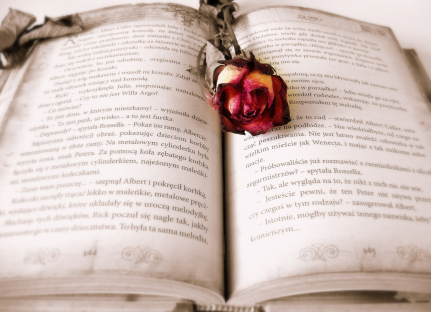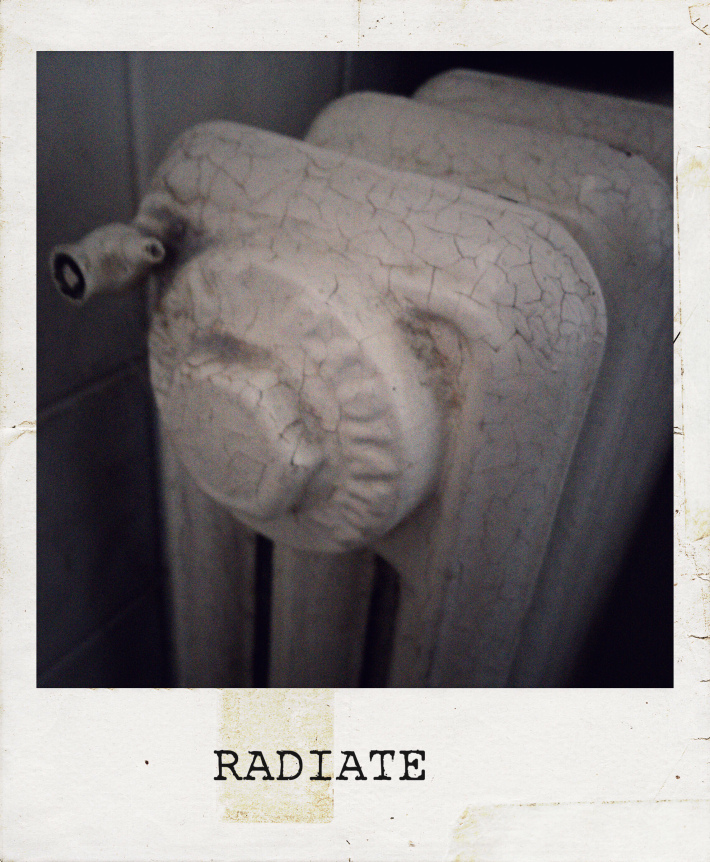
Today’s featured book: Mr. Churchill’s Secretary (Book #1 of Maggie Hope Mystery), by Susan Elia McNeal.
The premise: Okay, jumping straight in. Basic summary taken from Goodreads, as usual:
For fans of Jacqueline Winspear, Laurie R. King, and Anne Perry, Mr. Churchill’s Secretary captures the drama of an era of unprecedented challenge—and the greatness that rose to meet it.
London, 1940. Winston Churchill has just been sworn in, war rages across the Channel, and the threat of a Blitz looms larger by the day. But none of this deters Maggie Hope. She graduated at the top of her college class and possesses all the skills of the finest minds in British intelligence, but her gender qualifies her only to be the newest typist at No. 10 Downing Street. Her indefatigable spirit and remarkable gifts for codebreaking, though, rival those of even the highest men in government, and Maggie finds that working for the prime minister affords her a level of clearance she could never have imagined—and opportunities she will not let pass. In troubled, deadly times, with air-raid sirens sending multitudes underground, access to the War Rooms also exposes Maggie to the machinations of a menacing faction determined to do whatever it takes to change the course of history.
Ensnared in a web of spies, murder, and intrigue, Maggie must work quickly to balance her duty to King and Country with her chances for survival. And when she unravels a mystery that points toward her own family’s hidden secrets, she’ll discover that her quick wits are all that stand between an assassin’s murderous plan and Churchill himself.
In this daring debut, Susan Elia MacNeal blends meticulous research on the era, psychological insight into Winston Churchill, and the creation of a riveting main character, Maggie Hope, into a spectacularly crafted novel.
My thoughts [MOSTLY SPOILER-FREE!]: When I was first recommended this book, I was told that the protagonist works as a secretary for Winston Churchill during wartime and ends up having to solve a mystery or two during the course of her work. For some reason, I pictured a woman in her forties, kind of like Chris Pine’s (hilarious!) secretary/P.A. in Wonder Woman. I was a bit disappointed when I started the book and realized the protagonist was grad school age (she’s 24). I also didn’t get why Susan Elia McNeal made her American. It’s England in 1940. The character was born in England and has British citizenship. But the author had to make her American in upbringing. I figured it was because she’s American herself and this makes it easier to describe/explain things without being called out on accuracy, due to the outsider’s perspective. As the story progressed, I grew more accepting of the fact that Maggie is American and Wellesley-educated and not English and Cambridge-educated or something (it started to make more sense, too, once her family’s backstory was brought into it).
Some parts of this book are a bit clunky and clumsily executed. There are also continuity errors, mostly in regards to Maggie’s roommate Chuck (short for Charlotte). For example, there are many scenes where Maggie and her friends are out at a club/bar/restaurant/event somewhere. The author lists out everyone who’s there, and then describes where they are in the room. During one outing, Chuck and her boyfriend go off to dance. The people remaining at the table have a discussion about something. Despite being on the dance floor, Chuck is one of the people expressing her opinion. WUH? Perhaps Chuck returned to the table and I’d missed it. But no! A few lines later, Chuck and her boyfriend return to the friggin table and rejoin the group! I wouldn’t mind if this happened only once, but it keeps happening! In another scene, the other characters mention that Chuck’s boyfriend is going off for his RAF training. The group goes out, everyone present is named and their whereabouts in the room indicated. Chuck and her boyfriend are not among them, so I went “oh, the two of them must be meeting at his base or something instead, since this whole group is so codependent and wouldn’t split up otherwise”. Then suddenly, both Chuck and her boyfriend are there at the table having drinks! Waahhhh???
Another thing that bugged me is Maggie’s relationship with John Sterling. Don’t get me wrong– I like John, and I like him with Maggie. But I felt that from the point of his introduction onwards, the author wanted to make sure we didn’t forget that there was *sexual tension* between the two of them. It was like there was a big neon sign with an arrow pointing at him going “PRIMARY LOVE INTEREST”. It’s kind of like in Game of Thrones (the show) where the writers decide to have every character in every other scene go “Hey Jon Snow, I saw you looking at Dany.” *Nudge nudge* and then “So Khaleesi, you and that Jon Snow. How about it?” *Wink wink* I wouldn’t have really thought about it if they hadn’t kept shoving it in my face! This wasn’t as bad, because the other characters around them seem to ignore their antics until later on in the book, but there’s a whole section that’s completely from Maggie’s POV, and then suddenly, there’s a random-ass short paragraph from John’s POV (with no warning or page break!) going “JOHN THOUGHT MAGGIE WAS THE MOST BEAUTIFUL WOMAN AT THE OFFICE. BUT WOULD SOMEONE LIKE HER EVER NOTICE SOMEONE LIKE HIM?” or something like that, and I was dragged out of the moment. I just don’t think all these hints are necessary. Oh yeah, and Maggie is super weird and annoying around John, especially later on. There’s a scene where they go on a sort-of date and she just behaves in the most unreasonable, almost out-of-character way. If I were John, I would have walked out!
The depiction of Maggie’s relationship with her father could also use some help. Sometimes she seems like she’s all cool with him, and then one second later, she’s going off on him and telling him she hasn’t forgiven him yet. There’s a scene where she tells him to go dance with her, and when they get to the dance floor, she starts telling him what a shitty father he was, as if he was the one who dragged her out to the dance floor against her will and not the other way around. I get being confused about having your lying father back in your life after all these years, but the way the author wrote their scenes just didn’t do Maggie justice.
Overall, this is a protagonist and a series with some potential. I read it in a day, so there were enough happenings to keep me going, and I didn’t hate any of the characters. I just wish the editors did a better job and the author tried showing us some more things instead of telling us using big, bold letters.
My rating: 3/5.
Now, diversity scale time.
BAD-ASS FEMALE CHARACTERS? Ehhhh, I would say that Maggie and her gal pals are pretty strong, outspoken, smart women, although they seem to fit the “stock types” that are present in most friend groups in popular culture (the leader; the bubbly, naive one; the loud-mouthed one; the sexy one). Also, other than Maggie, the women at the Prime Minister’s office are stereotypes of older working office women.
Another thing I found annoying was the fact that Maggie very frequently unleashes angry feminist tirades on her male coworkers and friends. I am a feminist myself, and there is sexism in this book (although nowhere near the scale of other stories set during WWII)– Maggie is angry at the sexism she experiences, and she’s allowed to be, especially as someone who grew up raised by an accomplished academic aunt and went to Wellesley for undergrad. But when the rants go on for paragraphs and start to sound more like they’re from the 2010s than the 1940s, I start cringing. There are lots of *preachy* moments like this throughout MCS. 89%, B+/A- marks, as one of my professor used to give on papers.
Cultural diversity: Maggie is an American from New England. Her friend Paige is a “southern belle”, also from the states. The guys are typical upper-class English types. Chuck is Irish. Sarah is from Liverpool and has a Polish dance partner. There are pages devoted to talking about Britishisms (quite hilariously, in Very British Problems-style remarks), and I was impressed by how well the British “kept calm and carried on”, despite having bombs dropped on them every night. There is also a lot of attention given to English atrocities against the Irish, but here, the telling vs. showing problem comes in again; since two of the main villains are Irish/of Irish descent, this results in pre-Timothy Dalton era, one-dimensional James Bond villain-esque monologuing. Quite unfortunate. D+.
LGBTQIA representation: This one’s a bit tricky. Maggie’s friend David is gay, and since it was illegal back then (he actually says this at one point), he’s closeted, but among his friends, his homosexuality seems to be an open secret. Here, the continuity errors factor in once more, since at the beginning, when David’s on the phone with Maggie pleading with her to take the secretary job, she pretty much threatens him with her knowledge of this secret. Then waayyy later on in the story, David comes out to her and she reacts as if she never knew at all! HUH? Maggie’s aunt Edith is a lesbian who lives with her female partner, another Wellesley professor, and has been estranged from her mother for decades because of her sexual orientation. I would argue that Maggie, having been raised in an environment where her primary guardian is a lesbian, would be more likely to be an ally to David. It also makes sense for Sarah, who’s a ballerina and works with gay male dancers every day, to be cool with homosexuality as well. It was a bit of a stretch for me that everyone else was perfectly fine with it, though. It’s true that this isn’t the focus of the story, and this is fiction, so we’re allowed to suspend our disbelief, but I think because it’s set during the same time period as The Imitation Game, I couldn’t help but go, “This guy needs to do a better job hiding this!” Still, A- for representation.
Quality platonic friendships: HMMMM, I’m actually attempting to keep this review mostly spoiler-free, plot-wise (FOR ONCE!), so I can’t say much without giving away a major plot development, but I’m going to grade a B for this category. There are moments where the friendships in this book shine, such as when the girls are digging a hole for their bomb shelter, and Maggie and Sarah’s scenes together are great. John is the PRIMARY LOVE INTEREST *announcer voice*, and he doesn’t really interact in notable ways with the other girls, so he’s not eligible for this category. David and John are best friends, but I often felt as if David had a more obvious friendship with the girls. His scenes with John are a bit lacking.
So overall diversity score for this book is about 83%, which is a B- or a B depending on how strictly you interpret your grades.
Advertisements Share this:




